I’m regularly asked if there’s anything that can be done to prevent postpartum hair loss. After all, many of you know my work on optimizing nutrition during pregnancy and preparing for a smoother postpartum recovery via focusing on nutrient repletion.
You may be thinking: “If I can have better health and postpartum recovery with real food, surely, I can sidestep postpartum hair loss as well. Right?!” Women often ask me if there are supplements they can take, foods they can eat, shampoos to use, or anything else they can do to prevent losing hair postpartum.
Before we dive in, let me say this: I’m not going to sugar coat this or tell you that I have figured out some magical elixir of supplements that will immediately halt and reverse postpartum hair loss.
Nope, postpartum hair loss is real. It’s unavoidable. It sucks. And it’s totally NORMAL.
Anyone who tells you otherwise is lying and likely trying to sell you products or programs.
The Truth About Postpartum Hair Loss
In the research, postpartum hair loss is called “postpartum alopecia” and typically starts from 2-5 months postpartum & continues for an average of 6-24 weeks. Hair loss patterns differ, but are often most pronounced in areas we associate with male pattern baldness (above your temples anyone?).
Now that I’ve given you the truth about postpartum hair loss, let’s discuss why it happens, when you can expect hair re-regrowth (yes, it will grow back), and how to identify if your hair loss/regrowth is following normal patterns or whether follow-up testing for underlying health issues is warranted.
Why does postpartum hair loss happen?
Short answer: Hormones!
Postpartum hair loss is a natural response to hormonal changes that your body goes through during postpartum recovery.
Hair follicles go through three cycles of growth and rest: anagen, catagen, and telogen.
The anagen phase, which lasts approximately 1000 days, is a period characterized by massive hair growth.
In the catagen phase, hair follicles shrink and growth stops; this transitional phase lasts approximately 10 days.
In the telogen phase, hair follicles then enter a “resting” phase, which lasts approximately 100 days. During the telogen phase, hair will remain in the follicle until it is pushed out by the growth of a new anagen hair.
This cyclic hair growth occurs in a random mosaic pattern and each hair follicle has its own individual control mechanism over its lifespan and triggering the sequential phases.
There are many factors that can lead to hair loss, some related to pregnancy/postpartum and other factors that are not. This includes hormones, cytokines and growth factors, toxins, and deficiencies of nutrients, vitamins and eating too few calories. It also has been shown that intensive physical exertion, comorbidities, use of drugs and poor nutrition can lead to unhealthy hair.
Pregnancy induces unique changes to your hair growth cycle that naturally will lead to an increase in hair loss postpartum.
Here’s how it goes down:
During pregnancy, a variety of hormones rise significantly, including thyroid hormone, secondary androgen and estrogen hormones. In fact, progesterone increases approximately ninefold, estrone (an estrogen hormone known as E1) increases fourfold, estradiol (E2) increases eightfold, and estriol (E3) increases ninefold!
All of these hormones affect hair, and during pregnancy, alter your body’s hair growth cycle by causing hair follicles to remain in the anagen phase longer than normal. This leads to a reduction in the number of hairs that are shed, which increases hair fullness (hello beautiful, thick pregnancy hair!).
In fact, in late pregnancy, only about 5% of hair follicles are in telogen, compared to 35% during the postpartum period (normal level at any given time is around 13%).
After delivery, following the birth of the placenta, progesterone and estrogens levels return to normal within 2-4 days.
The normalization of these hormones causes hair cycles to become synchronized on the scalp. All that hair that wasn’t lost during pregnancy enters the “telogen-teloptosis process” and you have a mass exodus of hair.
For those who haven’t experienced it before, this may cause you to think that your hair loss is excessive. One research paper explains that postpartum hair loss is commonplace, but “possibly represents a panic condition for those who experience it for the first time.” Panic is right! It seems especially ill timed because this is usually when your sleep deprivation, exhaustion, and feeling like “I’m ready to get back to pre-baby life” has hit a peak. Why biology? WHY?!
Rest assured that for most women, this hair loss only represents the additional hairs that had been retained in the anagen phase that weren’t lost during pregnancy. Basically, your hair is playing catch up in the telogen phase and should soon return to its normal cycles.
To show you just how normal postpartum hair loss is, it is even observed in other mammals, such as sheep.
Is there anything I can do to reduce the severity of the process? Does nutrition prevent postpartum hair loss?
Unfortunately, there doesn’t seem to be anything promising that can outright stop the process of postpartum hair loss. As explained above, this hair loss is the result of normal hormonal changes. Although currently used to treat postpartum alopecia, thyroid supplementation (in women with normal protein-bound iodine concentrations), topical steroid locations, oral contraceptives, and special shampoos have not been proven overall to be effective in reducing postpartum alopecia.
Human studies are lacking on nutrition interventions to treat postpartum hair loss, but research on sheep has found more severe postpartum hair loss in sheep with higher levels of prolactin, cortisol, and lower levels of zinc, copper, and calcium. Whether the same holds true for humans has yet to be studied, but it points out the interplay of hormones, stress, and nutrition on postpartum hair loss.
You can certainly give your hair its best shot by ensuring you are eating a well-rounded, balanced diet (this will also be helpful in normalizing those postpartum hormones!) and keeping mineral stores up.
Your hair is primarily made up of keratin, a tough protein and so a lack of protein along with essential fatty acids, minerals (especially iron, zinc, and copper), vitamin A, C, D and E, B vitamins, and biotin can impact hair growth and loss. Eating a variety of meats, eggs, fish and other seafood (especially oysters), dairy (if tolerated) nuts and seeds, vegetables (including root vegetables and leafy greens), legumes, and berries can help ensure your hair is getting the nutrients it needs to be strong and healthy.
I also generally recommend that a high-quality prenatal vitamin be continued for at least the first 6 months postpartum as an “insurance policy” of sorts to replenish nutrient stores postpartum. Here are two comprehensive prenatal vitamins I recommend: Prenatal 1, Prenatal 2. There are many, many considerations when choosing a prenatal and other supplements, which are detailed in Ch 6 of Real Food for Pregnancy. I also cover postpartum supplementation and nutrient repletion in my comprehensive webinar on postpartum recovery and nutrient repletion if you want to dive deeper.
When will postpartum hair loss end? And when should I be worried?
If you are in good health status — meaning your bloodwork is normal, you are eating a nutrient-dense diet and do not have any thyroid issues — your postpartum hair loss should subside 6-24 weeks after it began.
Note that I said “after it began” because the timing of hair loss differs woman to woman. If you’re seeing little flyaway baby hairs pop up in the 6-24 weeks after you first began to lose lots of hair, this is a good sign that your hair re-growth phase has begun! Six to 24 weeks is a LONG time, so be patient. Most often, these baby hairs are most visible along your hair line and temples.
If you do not observe any hair re-growth in those 6-24 weeks, you may want to consider getting lab work done to assess if there’s an underlying health condition that needs to be addressed.
Anemia: For example, if you had an iron deficiency during pregnancy, are currently deficient, or suspect deficiency, associated anemia has been linked to hair loss in general but is easily identifiable, treatable, and will likely go away with resolution. You may want to request an iron panel to rule out anemia (lab test info in Ch 9 of Real Food for Pregnancy). I also talk about postpartum iron deficiency and anemia here.
Know that correcting anemia takes more than just iron; vitamin B12, vitamin A, copper, zinc, and other B vitamins are also key, which is why consuming nutrient-dense foods that contain a synergy of these nutrients — such as oysters and liver — is so effective at reversing anemia whereas stand alone iron supplementation only goes so far (or can actually cause more problems if iron deficiency is not the cause of your specific case of anemia).
Thyroid: If you have been told you have a thyroid issue or suspect you have one (see here for signs and symptoms), this could also be associated with excessive hair loss. In one study of postnatal women experiencing moderate to severe postpartum alopecia (and other symptoms typically associated with impaired thyroid) with a normal thyroid stimulating hormone (TSH) and T4 within the range of normal but within the lower sector of the laboratory defined normal range (meaning subclinical hypothyroidism), 6 patients were treated with 25 mcg of ethinyl estradiol (estrogen) and a low dose of oral thyroxine. All patients’ hair conditions resolved soon after receiving their treatment. You may want to request a full thyroid panel to rule out postpartum thyroiditis.
If you have ruled out these other issues but are still concerned your hair shedding isn’t normal, take a look at your eating habits and stress/mental health.
- Are you eating enough? If you’re breastfeeding, remember that your caloric needs are higher because producing milk takes a lot of energy.
- How is your stress level?
- How is your mental health?
These are all things that can affect your hormones, and therefore, your hair loss.
You might seek a multidisciplinary approach here and enlist the help of a mental health expert/therapist (see Postpartum Support International for resources and referrals) or ask for help from friends or family members to create more space/time for yourself (walks outside while baby wearing were one way I created “me time” when I didn’t have extra help around).
If your hair loss is nutritionally-related and the overwhelm of motherhood has made it hard to get nutritious meals on the table, can you find a meal delivery service that can take some of the pressure off?
Beyond anemia, other nutrient/mineral deficiencies can manifest as slow hair growth. Electrolyte replenishment is especially important for nursing mothers, as a significant amount of electrolytes are passed via breast milk to baby. This is why I’m a big fan of supplementing electrolytes during breastfeeding, such as adding LMNT to water (LMNT provides sodium, potassium, and magnesium). Other options for mineral-rich beverages include the electrolyte replenishment drink featured in Real Food for Pregnancy, tea made with nettle leaves, or coconut water. Of course, a nutrient-dense diet also supplies a significant amount of minerals.
Does hair loss worsen with subsequent pregnancies?
Not necessarily. In subsets of women who find themselves undernourished in their subsequent pregnancies, nutritional depletion could play a role in the severity of postpartum hair loss. This is one of the reasons eating a diet rich in real food for postpartum recovery is so important.
That being said, some women may find that genetic hair loss issues (like female pattern baldness, in which hair thins on the top and front of the scalp) can be triggered by pregnancy. This is the type of hair loss that might become more pronounced with each pregnancy.
Will breastfeeding make it worse?
No! Although there isn’t much research in general on breastfeeding and postpartum alopecia, we do know that prolactin, the hormone responsible for milk production in breastfeeding mothers, acts as an autocrine modulator of hair follicles and has an inhibitory effect on hair follicles (meaning that it can affect hair growth and loss).
In non-breastfeeding mothers, prolactin returns to pre-pregnancy levels fairly quickly. Given this data, it has been theorized that breastfeeding mothers may experience postpartum alopecia earlier in the postpartum period and feel it more markedly, but that’s not true.
In fact, there is some research suggesting that breastfeeding may actually lead to a higher anagen rate (more growth!) and lower telogen (less shedding) rate at 4 months postpartum although hair loss overall appears to even out within a year between breastfeeding and non-breastfeeding mothers.
Despite needing further research, rest assured that breastfeeding has not been shown to cause greater hair loss in the postpartum period.
Will the time of year that I give birth have any influence?
It’s definitely possible. Hair growth in general increases during the warmer months and typically reaches peak levels in September, then decreases to the lowest level sometime in December‐January. This is likely due to the influence of certain UV-rays (sunlight) on hair growth, but it could also be related to other factors, like dietary shifts or temperature changes. The anagen rate is approximately 90% in August and September. If you deliver in the fall, because of concurrent seasonal hair shedding in December/January, you may observe a more prominent hair shedding.
The bottom line
Although postpartum hair loss can be scary and anxiety-inducing for the first-time mom, you should start to see hair regrowth within a few months after hair ceases falling out in large amounts (I know, that seems like forever). If that does not happen, you may want to request a thyroid panel to rule out postpartum thyroiditis and labs to rule out anemia.
Remember to eat enough and to eat a well-balanced diet high in protein, iron, and other aforementioned key nutrients to help encourage your hair cycles to return to normal. Manage stress as best as possible and prioritize your mental health.
Remember, postpartum recovery is a long process with ups and downs. Realistic expectations are key.
What is/was your experience with postpartum hair loss?
Until next time,
Lily
PS – The full scoop on preparing for a smooth postpartum is covered in my detailed webinar: Postpartum Recovery & Nutrient Repletion via the Women’s Health Nutrition Academy. If you loved the postpartum chapter of Real Food for Pregnancy and want even more info, that’s where to go for a full 90-minute, research-heavy class.
References
- Gizlenti, S., and T. R. Ekmekci. “The changes in the hair cycle during gestation and the post‐partum period.” Journal of the European Academy of Dermatology and Venereology 28.7 (2014): 878-881.
- Trüeb, Ralph M. “The Hair Cycle and Its Relation to Nutrition.” Nutrition for Healthy Hair. Springer, Cham, 2020. 37-109.
- Pringle, T. “The relationship between thyroxine, oestradiol, and postnatal alopecia, with relevance to women’s health in general.” Medical hypotheses 55.5 (2000): 445-449.
- Piérard-Franchimont, Claudine, and Gérald E Piérard. “Alterations in hair follicle dynamics in women.” BioMed research international vol. 2013 (2013): 957432. doi:10.1155/2013/957432
- Byeon, Je Yeon, et al. “Effectiveness of Hair Care Products Containing Placental Growth Factor for the Treatment of Postpartum Telogen Effluvium.” Archives of Aesthetic Plastic Surgery 23.2 (2017): 73-78.
- Eastham, J H. “Postpartum alopecia.” The Annals of pharmacotherapy vol. 35,2 (2001): 255-8. doi:10.1345/aph.10153
- Taha, R. “Hematological, biochemical and hormonal studies on postpartum alopecia in ewes.” The Journal of American Science 8.9 (2012): 968-972.
- Mirallas, Oriol, and Ramon Grimalt. “The Postpartum Telogen Effluvium Fallacy.” Skin appendage disorders vol. 1,4 (2016): 198-201. doi:10.1159/000445385

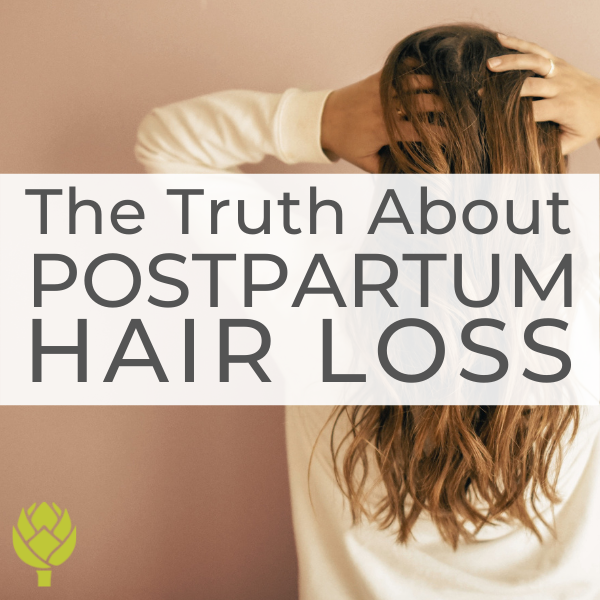

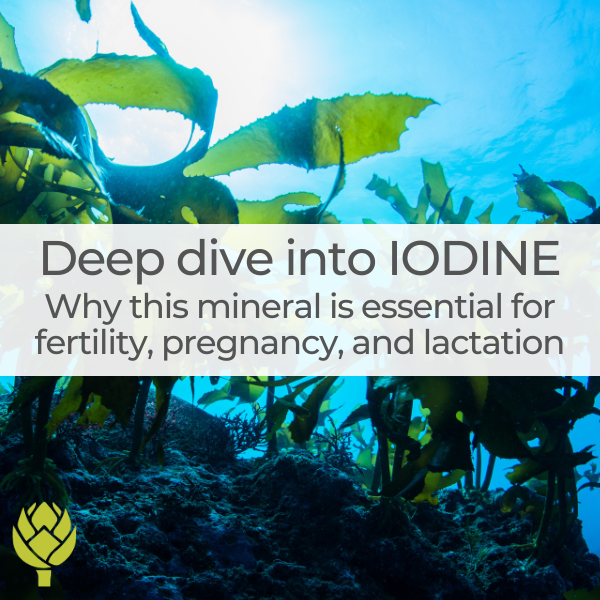
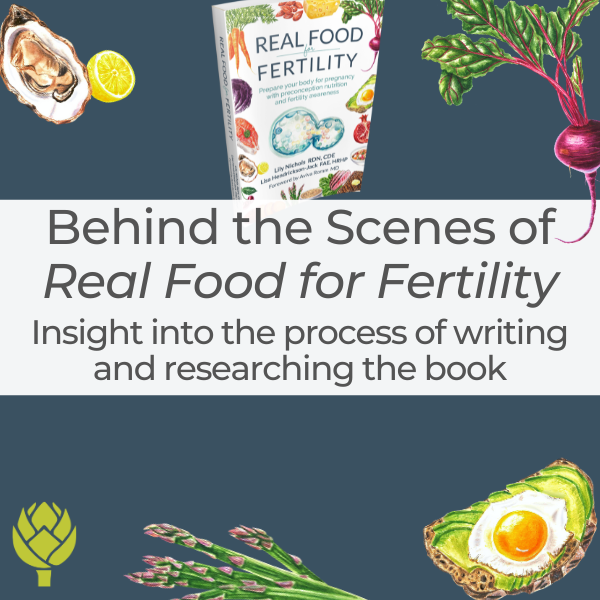
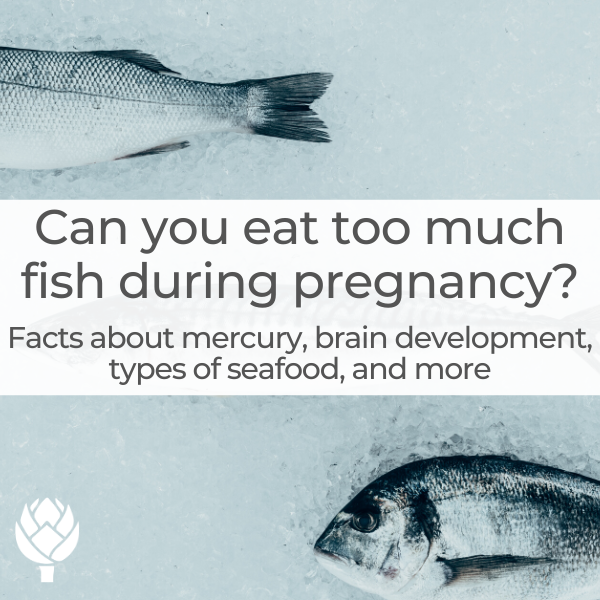
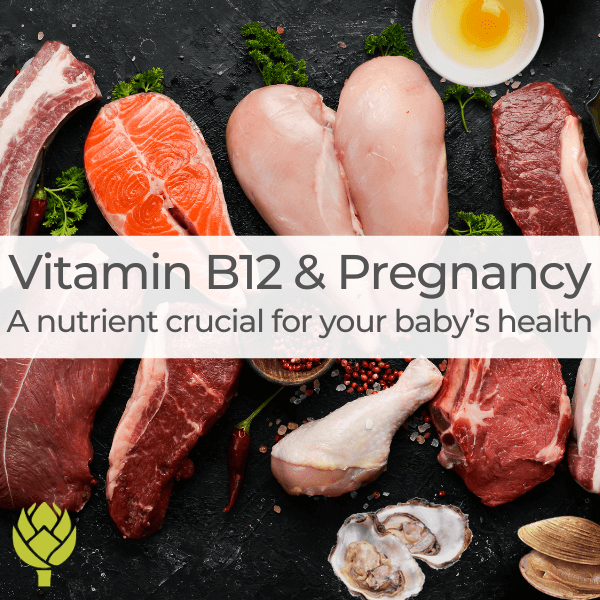



This was such a reassuring read. When I first noticed my postpartum hair loss I flipped out and started scouring the internet for postpartum hair loss cures, shampoos to stop hair loss, special hair masks, hair building supplements… you name it, I was researching it at all hours of the day. If I had known postpartum hair loss was normal and what kind of timeline to expect, it would have saved me a lot of angst. Turns out my hair regrowth followed almost exactly the timeline you laid out. The baby hairs/bangs situation wasn’t the most attractive, but the hair regrowth happened eventually! Patience, mamas! Patience.
I wish I had read this before having my first child! The hair loss sucks, but it does grow back. Ignore all the “Postpartum Hair Loss Remedy” ads and other stuff on the net. It grows back naturally if you nourish yourself well. I’m really glad I had Real Food for Pregnancy for my second pregnancy and had taken your postpartum recovery webinar from the Women’s Health Nutrition Academy, because I felt so much more nourished the second round and I think my hair grew in healthier and thicker than ever! Probably all those collagen-rich foods!
My hair loss postpartum started right around 3 months postpartum and I’m still shedding a lot at 5 months. I recently noticed some new growth around my hairline and temples so there is hope! Thanks for the reassuring article, Lily! I’m trying my best to focus on postpartum recovery foods! Your work has been so helpful to me.
PS – My pregnancy and birth were beautiful and my baby is healthy as can be!
Mine started around 5 months and slowed down probably around 7 months. I followed the postpartum hair loss timeline you laid out pretty close! I am 9 months post hair loss starting and and my fly always are about 5 inches long. While the hair loss was really intense for a month or so and I hated washing/brushing my hair cuz of how much fell out, it did eventually stop. Had I known the timeline my hair loss was likely to follow, I Would have been WAY less stressed about the loss in the moment. I swore, I thought I was going bald for a bit.
Thank you for this post, Lily. So informative. I’m not looking forward to the postpartum hair changes, but knowing it’s normal will come in handy when I get to that phase.
PS – currently 8 months pregnant and it’s been such an easy pregnancy. No swelling whatsoever and no issues. i owe it to Real Food for Pregnancy and I even got a copy for my OB from your bookshop. She’s now recommending it to all her patients!
Interesting article!
I didn’t suffer hair loss after my first pregnancy. I didn’t breastfeed anyway. I didn’t eat sweet junk food or sugary drinks. Liver is always my fave meal, I eat is regurarly.
I hope no hair loss for second baby.